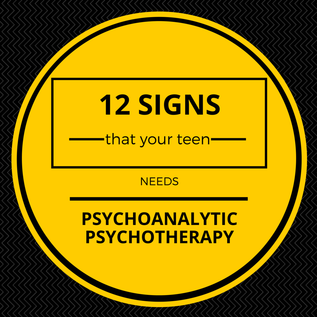
Child psychoanalyst and psychoanalytic therapists work with children (and their parents) as young as infants. Psychoanalytic technique changes depending on the age and developmental needs of each individual patient but I will leave that for another post.
Let's look at 12 signs that your teenage son or daughter may benefit from psychoanalytic psychotherapy. Some of these signs you may have noticed earlier in your child's life and the sooner you get some professional help, the better.
Sign #1. Concern from teachers and school counselors or social workers - school staff are usually the first to alert parents that something may be going on with their son or daughter. If the school counselor or social worker expresses concerned for your teen’s behavior or emotional state, you may want to ask them for a referral or consult with a psychoanalytic psychotherapist.
Sign #3. Skipping school and classes - truancy and delinquent behaviors are another indicator that something may be interfering with your teen’s ability to function academically and or socially. It is often difficult for teens to talk to their parents about what's going on with them and skipping on classes is usually a sign that something may be going on.
Sign #4. Frequent arguments at home - every teenager argues with their parents in an attempt to assert their independence and sense of autonomy. However, if the arguments are persistent and worrisome, you may want to consult a professional.
Sign #5. Substance abuse (alcohol, marijuana, etc.) - substance abuse is probably the most widely used, self-medicating tool used by both teens and adults to cope with emotional difficulties. Usually, it is used to relieve anxiety, to temporarily improve depressed mood or simply as an avoidance strategy.
Sign #6. Recent change in the family (divorce, separation, etc.) - parental and marital discord is always hard on the children. When parents decide on divorce, the kids experience variety of emotions, including guilt, anger, hope, denial, sadness, etc. Psychoanalytic psychotherapy offers ways to reduce the negative impact of the disruption for the whole family, especially the child/adolescent.
Sign #7. Loss/death in the family - unexpected life circumstances put strain on every family. Therapy provides a space to make sense of the nonsensical and cope with the loss in a healthy way. If your child/adolescent has experienced a loss in the family, this is a sign that they may benefit from talking to someone.
Sign #8. Traumatic experiences - physical, sexual or emotional abuse are among the most common reasons for people to seek out professional counseling. Trauma is also the number #1 problem that causes severe anxiety in both adults and children. If your teen has gone through a traumatic experience, psychoanalytic psychotherapy is one of the most appropriate therapeutic approaches to address it.
Sign #9. Angry outbursts and getting into fights - what cannot be expressed through words is often communicated through action - fights, delinquent behaviors, drinking, etc. Meeting it with punishments or disapproval does little for the kid and often escalates the internal difficulty. If your teen is angry and violent, this is a clear indication that s/he may benefit from psychotherapy.
Sign #10. Self-injurious and risky behavior - self-injurious and risk taking behaviors are often signs that your teen is struggling with emotional issues and is trying to cope with them the best way they can. It can be very scary for the parents to literally see their child's pain marked on their body so don't hesitate and get some help.
Sign #11. Sexual acting out - teens usually engage in sexual exploration one way or another. However, premature sexualized behavior and comments may be signs of deeper struggles.
Sign #12. Withdrawn and isolative behavior can be easily neglected as it is not explosive or loud in any way. However, it may indicate that your teen is depressed and getting a professional opinion is crucial for your kid’s safety.
For more articles on common mental health issues, affecting you and your family, subscribe to Mental Health Digest and get the latest issue emailed to you today by leaving your name and email address in the contact form here.
Do you have questions? Found this article helpful? I would love to hear from you.



 RSS Feed
RSS Feed